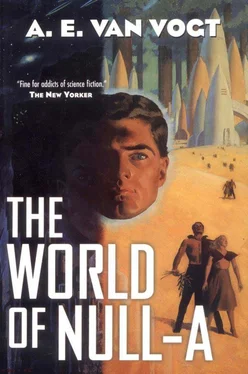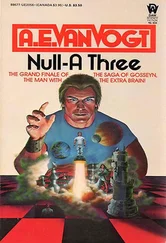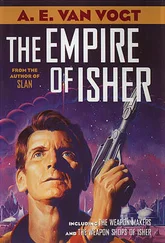He entered slowly, and, ignoring both “X” and Hardie, walked over to Gosseyn. He had two prints in his hand, and he paused with them directly in front of his prisoner and stared at him.
“What have you found?” said Hardie from Gosseyn's left.
Thorson waved at him, an impatient command to be silent. It was a startlingly discourteous gesture and, what was more, he seemed to be unaware that he had made it. He stood there, and suddenly his personality was not just that of one more individual. He had been holding it in. Underneath the cold exterior was a blaze of nervous energy, a supremely potent human being. Gosseyn saw that his manner was not one of the deference to superiors. It was command, assured, final, unequivocal. When he agreed with the others, it was because he wanted to. When he disagreed, his way was decisive.
“X” wheeled over and gently removed the prints from Thorson's fingers. He handed one to Hardie. The two men examined the photographs with two distinct and separate emotions.
“X” half climbed out of his chair. The movement revealed several things about his semi-plastic body. It showed his height. He was taller than Gosseyn had thought, at least five feet ten or eleven. It showed how his plastic arm was fastened to the plastic cage around the middle of his body. It showed that his face could look startled. He half whispered, “It's a good thing we didn't let him go to see that psychiatrist. We struck at the right moment, at the beginning.”
Michael Hardie looked irritated. “What are you babbling about? Don't forget that I'm in my present position entirely because of your ability to control the games of the Machine. I never could get all this null-A stuff about the human brain into my head. All I see is a solid core of brightness. I presume that those are the lines of nerve patterns, and that they will untangle when enlarged on a screen.”
This time Thorson heard. He walked over, pointed .at something on the print, and whispered an explanation that slowly drained the color from Hardie's face.
“We'll have to kill him,” he said grayly. “At once.”
Thorson shook his head irritably. “Whatever for? What can he do? Warn the world?” He grew more intent. “Notice there are no bright lines near it.”
“But suppose he finds out how to use it?” That was Hardie again.
“It would take months!” exclaimed “X.” “You can't even make your little finger flexible in twenty-four hours.”
There were more whispers, to which Thorson responded furiously, “Surely, you don't expect him to ex-cape from that dungeon. Or have you been reading Aristotelian fiction, where the hero always wins?”
There was no question finally of who was going to have his way. Men came and carried Gosseyn, chair, manacles, and all, down four flights of stairs into a solid-steel dungeon. The final stairs led down into the dungeon, and when the men had climbed back to the floor above, a motor lifted the whole staircase through a hole in the ceiling twenty feet above. A steel door clanged down over the hole, and heavy bars were slammed shut. There was silence.
Gosseyn sat still in the steel chair. His heart hammered, his temples throbbed, and every few moments he felt faint and ill with reaction. There seemed no end to the perspiration that poured from him.
“I'm afraid,” he thought. “Horribly, wretchedly afraid.”
Fear must derive from the very colloids of a substance. A flower closing its petals for the night was showing fear of the dark, but it had no nervous system to transmit the impulse and no thalamus to receive and translate the electric message into an emotion. A human being was a physico-chemical structure whose awareness of life was derived from an intricate nervous system. After death, the body disintegrated; the personality survived as a series of distorted impulse-memories in other people's nervous systems. As the years flew by, those memories would grow dimmer. At most, Gilbert Gosseyn would survive as a nerve impulse in other human beings for half a century; as an emulsion on a film negative for several score years; as an electronic pattern in a series of cathode-ray cells for perhaps two centuries. None of the potentialities diminished even fractionally the flow of perspiration from his body in that hot, almost airless room.
“I'm as good as dead,” he thought in agony. “I'm going to die. I'm going to die.” And even as he thought the words, he realized that his nerve was breaking.
A light flashed into brilliance on the ceiling; a metal slot was shoved open. A voice said, “Yes, tell Mr. Thorson he's doing fine.”
Minutes passed, and then the stairway came rushing down. Its lower end clanged on the floor. Workmen began to edge down the stairs carrying a table. In quick succession the machine that had already been used on Gosseyn, and several others of different shape and purpose, were carted down and bolted to the table. The workmen retreated quickly up the stairs.
Two hard-faced men came down gingerly. They examined Gosseyn's hands and wrists. They went away, finally, and there was silence.
Then once more the door slid open metallically. Gosseyn shrank, expecting Thorson. Instead, Patricia Hardie came racing down the steps. As she unlocked the manacles, she said in a low, urgent tone, “Follow the hallway outside to the right for a hundred feet. Under the main staircase at that point you will see a door. Inside that door is a narrower stairway which leads up two flights to within twenty feet of my apartment. Perhaps you can hide there safely; I don't know. From this moment, you are on your own. Good luck.”
Having freed him, she ran up the stairway ahead of him. Gosseyn's muscles were so cramped that he stumbled awkwardly on every step. But her directions had been sound. And by the time he reached the girl's bedroom, his circulation was back to normal.
A subtle aroma of perfume identified the bedroom suite. From the French windows, near the canopied bed, Gosseyn gazed at the atomic beacon of the Machine. It blazed so close that it almost seemed to him he could put forth his hand and grasp the light.
Gosseyn did not share Patricia Hardie's hope that he could hide safely in her bedroom. And besides, now before his escape was. discovered, was the time to make the break. He started forward, and then drew back hastily as a half-dozen men with guns passed under the balcony in single file. When he peeked out a moment later, two of the men were crouching behind a line of shrubbery less than a hundred feet away.
Gosseyn retreated into the bedroom. It required no more than a minute to glance in at the four rooms that made up the girl's apartment. He chose the dressing room as his best vantage point. It had a window and a small balcony that opened on an alcove away from the main grounds. At worst, he could swing down and slip from shrub to shrub. “He sat down heavily on the long bench before the huge, full-length mirror. Sitting there, he had time to wonder about Patricia Hardie's action.
She had taken a grave risk. The reason was obscure, but it seemed apparent that she regretted her participation in the plot against him.
The thought ended as a distant door clicked faintly. Gosseyn climbed to his feet. It might be the girl. It was. Her voice came softly a moment later at the dressing-room door.
“Are you in there, Mr. Gosseyn?”
Gosseyn unlocked the door without a word, and they stood facing each other across the threshold. It was the girl who spoke first.
“What are your plans?”
“To get to the Machine.”
“Why?”
Gosseyn hesitated. Patricia Hardie had helped him, and so deserved his confidence. But he had better remember that she was a neurotic who had probably acted on impulse. She might not yet realize the full implications what she had done. He saw that she was smiling grimly.
Читать дальше










